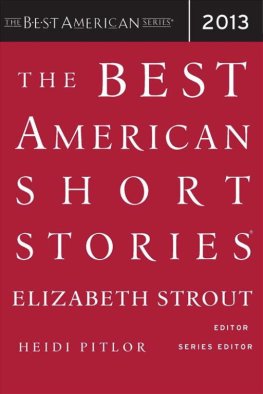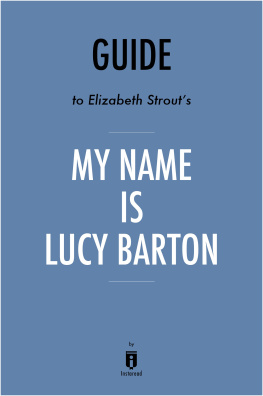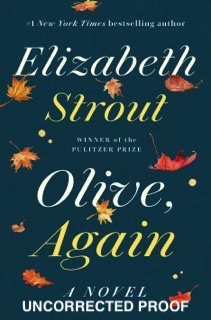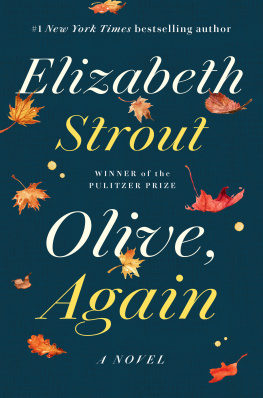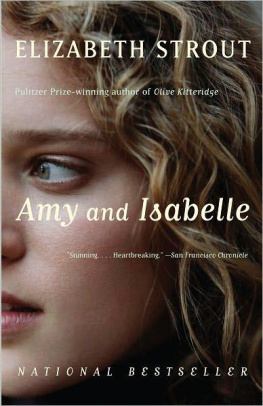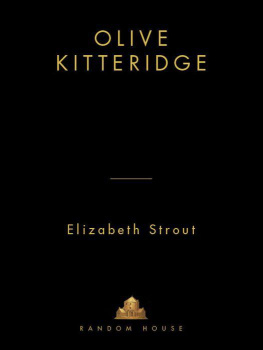A COMPANION TO THE WORKS OF ELIZABETH STROUT
A COMPANION TO THE WORKS OF
ELIZABETH STROUT
Katherine Montwieler
SWALLOW PRESS
ATHENS, OHIO
Swallow Press
An imprint of Ohio University Press, Athens, Ohio 45701
ohioswallow.com
2022 by Katherine Montwieler
All rights reserved
To obtain permission to quote, reprint, or otherwise reproduce or distribute material from Swallow Press / Ohio University Press publications, please contact our rights and permissions department at (740) 593-1154 or (740) 593-4536 (fax).
Printed in the United States of America
Swallow Press / Ohio University Press books are printed on acid-free paper
30 29 28 27 26 25 24 23 22 5 4 3 2 1
Library of Congress Cataloging-in-Publication Data available upon request.
Names: Montwieler, Katherine, 1970 author.
Title: A companion to the works of Elizabeth Strout / Katherine Montwieler.
Description: Athens, Ohio : Swallow Press, [2022] | Includes bibliographical references and index.
Identifiers: LCCN 2022018847 (print) | LCCN 2022018848 (ebook) | ISBN 9780804012409 (hardcover) | ISBN 9780804012416 (paperback) | ISBN 9780804041225 (pdf)
Subjects: LCSH: Strout, ElizabethCriticism and interpretation. | American fictionWomen authorsHistory and criticism. | American literature21st centuryHistory and criticism.
Classification: LCC PS3569.T736 Z78 2022 (print) | LCC PS3569.T736 (ebook) | DDC 813/.609dc23/eng/20220708
LC record available at https://lccn.loc.gov/2022018847
LC ebook record available at https://lccn.loc.gov/2022018848
for
Mom and Liz
Contents
Acknowledgments
Thank you, Elizabeth, for the work, inspiration, and generosity. Thank you, Ricky, Stephanie, Tyler, and Beth, for your support of this project. Thank you, Mom and Dad, for decades of support, guidance, and inspiration. My work is possible because of you. Thank you, Mom, for introducing me to the work of Elizabeth, and, Dad, for modeling trusting faith. Thank you, Janet, for reading the manuscript so carefully. Thank you, Barbara, for your extraordinary mentoring, generosity, and welcome to North Carolina. Dear Donna, so many thanks. Thank you, Erin, Heather, Johanna, Aimee, Amie, Rebekah, Kimberle, Gena, Anna Maria, Jennifer, Kristine, Joanna, Ryanne, Kris, Jeffrianne, Heather, Nicole, Quinn, Zach, Josh, Trisha, Emily, Dawn, Matthew, Melanie, Emily, Alicia, Joanna, Helen, and Jamie, for your patience, your challenges, your words, your willingness to wrestle and to help me at home and on the page. Thank you, Amy, Hannah, Michelle, Maia, Sarah, Kimi, Cala, Michelle, Kathleen, Sue, Lynn, Kemille, Laura, Donyell, Candace, Vibeke, Denise, Mike, Lewis, Dan, Bill, Vic, Meghan, Nick, Jennifer, Dana, Nina, Karen, and Lisa, for pointed conversations, humor, and companionship. Michelle, Kemille, Tiffany, Aswani, Don, Keith, Chris, Dana, and Kathleen, thank you for providing space, time, and support for this endeavor. Thank you, Joyce, Mike, Carolyn, and Jim, for long-distance support, so many recommendations, and inspiring families. Tricia, Roxanne, Anne, Elizabeth, Miranda, Nelson, Beth-Ann, and Lisa, thank you for catalyzing this journey too many years ago to count. Thank you, Malin, Trisha, Marianne, Ann, Susan, and Paula, for modeling mentoring across the miles and answering my calls. Jake and Thea, so much gratitude for the conversations, companionship, reading recommendations, patience, and love. Jan and Doyle, Curt and Alice, thank you for your patience, good humor, and resilience. Thank you to the anonymous readers who challenged me and supported this work. Im so grateful. Dear, dear Katiethe walks, the spoken and unspoken conversations, the texts, and the provocationsyour fingerprints are all over these pages. Thank you. Maisie and Averil, your spirit of adventure, zest for life, indomitability, humor, intelligence, and compassion inspire me every day. Thank you. Mark, words fail. Gratitude, respect, and love till the end of days.
Introduction
ELIZABETH STROUT IS ONE OF THE MOST POPULAR and critically acclaimed US writers of the twenty-first century. In the last twenty-one years, she has published eight books, including Oh William!, which appeared in the fall of 2021. Strout is the rare crossover writer, like Margaret Atwood, Alice Walker, or Marilynne Robinson, appreciated by critics and beloved by hundreds of thousands. Her ability to reach both commercial audiences and literary elites speaks to a particular consciousness, a sensitive, insightful, and humorous one that book buyers from all walks of life value. And its not just readers. Strouts first novel, Amy and Isabelle, was made into a TV movie; her third book, Olive Kitteridge, was filmed as an HBO miniseries; the rights to her fourth book, The Burgess Boys, have been optioned by Robert Redford; and an adaptation of My Name Is Lucy Barton appeared on the London and Broadway stages before the pandemic shuttered them. Her sales and perennial presence on book club lists indicate a tremendous impact on the popular realm, and the growing attention to her in academia charts her importance in American letters. In the wake of the #MeToo movement and the awareness of the political and cultural clout of the White working class, two issues that Strouts fiction anticipated in many ways, this is the writers moment.
Born in 1956, Strout didnt publish her first novel until she was forty-two, sixteen years after the publication of her first short story. She had been working for decades on her fiction, however. As she told Mary Pols, I spent years and years and years trying to find my storytelling voice and then I found it. And also, I got older, so there were more life experiences that arrived, that one can use in various ways in their work. But I was apprenticing that entire time. I was really working those first 20 years. Following the publication of Amy and Isabelle in 1998, several other books appeared: Abide with Me in 2006; Olive Kitteridge in 2008; The Burgess Boys in 2013; My Name Is Lucy Barton in 2016; Anything Is Possible in 2017; Olive, Again in 2019; and Oh William! in 2021. She has been not only prolific but also lauded, recognized as a finalist for the National Book Critics Circle Award and the PEN/Faulkner Award, long-listed for the Booker, shortlisted for the Orange Prize, awarded the Pulitzer Prize, and elected to the American Academy of Arts and Letters.
Strouts productivity at that particular time in historythe first two decades of the twenty-first centurymerits a closer look. Biographically, her career took off once her only child left for college and she left her first marriage. But more broadly, that is a fascinating time for Strout to have made her mark. Those two decades saw the flowering of an immensely popular and influential literary genre, chick lit, that remains popular (we might think, for example, of Helen Fieldings Bridget Joness Diary, Lauren Weisbergers The Devil Wears Prada, or Sophie Kinsellas Love Your Life).
Strout is indeed a careful writer, sensitive to the auditory echoes of her prose. In her 2017 interview with Samantha Vorwald, she observes:
I really believe in the sentence. Every sentence has to have some heartbeat of life to it. Every sentence that gets put down has to come from the sentence before it and lead into the sentence thats coming after. There has to be a wholeness at work, and there has to be a heartbeat in every sentence, if that makes sense. And its not easy to learn to do. I trained myself over the years to get rid of any sentence thats dead weight.... That would be the business that carries it forward.... When I write, its very aural. My ear is very, very important to me. So the sentence has to land on the ear the right way, and then if that is landing on the readers ear the right way, they will be carried forward. But its something Ive learned to hear and learned to do and to get rid of every twigwhat I call twigsevery dead piece of wood. Just to get it out of there.


